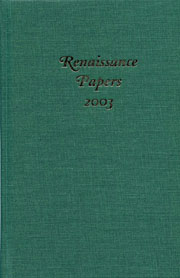Book contents
- Frontmatter
- Contents
- Renaissance Papers
- Homer, Erasmus, and the Problem of Strife
- William Tyndale Among the Demons
- The Printing of “this written book”: G.T. and H.W.'s Editorial Disputes in The Adventures of Master F.J.
- George Puttenham as Comedic Artificer
- Amoret and Scudamour Woo and Wed: Two Courtly Histories and a Stalemate
- Strange Bedfellows: “The Churching of Women” and The Taming of the Shrew
- “Romans, countrymen, and lovers”: Performing Politics, Sovereign Amity and Masculinity in Julius Caesar
- “Rouse Up a Brave Mind”: The Merchant of Venice and Social Uprising in the 1590s
- Revenge Tragedy and Elizabeth Cary's Mariam
- “very worthely sett in printe”: Writing the Virginia Company of London
“very worthely sett in printe”: Writing the Virginia Company of London
Published online by Cambridge University Press: 12 September 2012
- Frontmatter
- Contents
- Renaissance Papers
- Homer, Erasmus, and the Problem of Strife
- William Tyndale Among the Demons
- The Printing of “this written book”: G.T. and H.W.'s Editorial Disputes in The Adventures of Master F.J.
- George Puttenham as Comedic Artificer
- Amoret and Scudamour Woo and Wed: Two Courtly Histories and a Stalemate
- Strange Bedfellows: “The Churching of Women” and The Taming of the Shrew
- “Romans, countrymen, and lovers”: Performing Politics, Sovereign Amity and Masculinity in Julius Caesar
- “Rouse Up a Brave Mind”: The Merchant of Venice and Social Uprising in the 1590s
- Revenge Tragedy and Elizabeth Cary's Mariam
- “very worthely sett in printe”: Writing the Virginia Company of London
Summary
Before any of its settlers ever left for Jamestown, the Virginia Company of London began a fervent campaign to publish a viable New World identity for itself. Beginning with the early “Justification for planting in Virginia,” the organization's work consistently reflected its leaders' conviction that “some forme of writinge in way of Iustification of [the] plantation” in Virginia should be repeatedly “conceiued, and pass[ed, …] into many handes.” As the following excerpt from Virginia's official Lawes Divine, Morall and Martial shows, however, that effort soon became far more complicated as the Company found it difficult to defend the positive image it had published for itself against less flattering assessments:
No … person … shall dare to … calumniate or vtter vnseemely … speeches, … against … the zealous indeauors, & intentions of the … Aduenturers for this pious and Christian Plantation, or against any publique booke … which by their mature aduise … shall be thought fit, to be set foorth and publisht, for the aduancement of the good of this Colony, … vppon paine for the first time … to bee whipt … and for the second time … to be condemned to the Gally [sic] for three yeares, and for the third time … to be punished with death.
- Type
- Chapter
- Information
- Renaissance Papers 2003 , pp. 167 - 184Publisher: Boydell & BrewerPrint publication year: 2004

